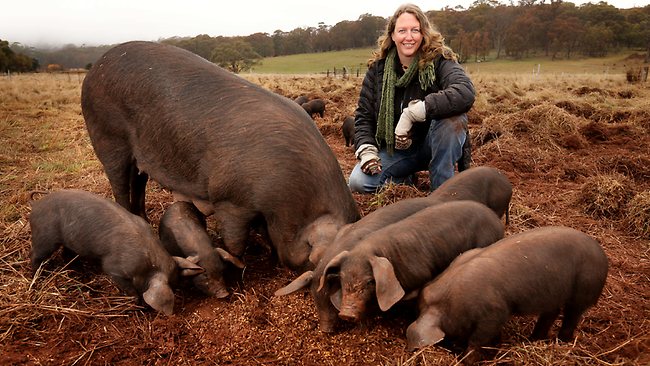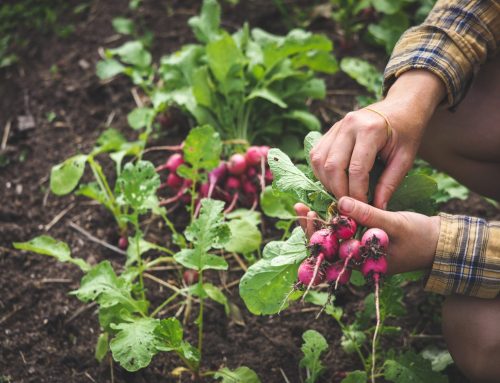by Tammi Jonas, Jonai Farms & Meat smiths, 14 March 2014
What is fair food?
Who’s a fair food farmer, and why do we need Fair Food Farmers United – aren’t there enough advocacy bodies? And anyway, what exactly is fair food? The launch of the Fair Food Farmers United (FFFU) branch of the Australian Food Sovereignty Alliance (AFSA) this week raised a lot of questions and encouraged some good discussion around precisely these questions, which is exactly what we hoped for.
So first we should really drill into what we mean by ‘fair food’. I’m just one farmer of thousands in our vast country, so I’ll speak on behalf of myself and our family only, though my understanding of ‘fair food’ has been shaped and re-affirmed in numerous conversations with others. The simplest way I understand ‘fair food’ is that it’s fair ‘soil to stomach’. If we think soil to stomach, we’ve captured every element of the planet affected by growing, distributing, storing, cooking and eating food. Even the so-called waste products are captured as then we’re right back to soil.

Tammi Jonas from Jonai Farms
What does ‘fair’ mean?
But what does ‘fair’ mean? To put it simply, I think of it just like I was taught as a kid – are you taking more than is your fair share? We can apply this kindergarten logic to soil health, livestock health and well being, farmer viability, supply chain employees’ wages, water and air health, people’s access to nutritious, delicious food and ultimately population health. Sure, in a complex supply chain the answer will be complicated, but avoiding complicated answers is part of what got us into this unfair food system in the first place… If you accept this view of what’s fair food, then a fair food farmer is simply someone growing food (and/or fibre) according to those principles – they’re working to be fair from soil to stomach. We all make mistakes, and we’re all trying to improve our systems all the time, and I reckon that’s part of being a fair food farmer too.
Why do we need Fair Food Farmers United?
Finally, why do we need Fair Food Farmers United? For me, it’s primarily a positive move for those of us focused on feeding Australia fairly to talk amongst ourselves – not to be talked ‘at’ – but to pool our collective wisdom and share what’s working well and what’s not. Whether it’s how we’re nourishing our soil, getting our products to a market that pays a fair price, or ensuring the food we sell is as nutritious and delicious as we can make it, we all have something to share from our own experiences. And once we’ve established what our biggest issues are, we can start to work towards solutions together. A focus on exports won’t get us there, and nor will a continued reliance on overly long supply chains that inevitably lead to just two massive retailers.
It’s time we stand at the farm gate, united, and do what we do best – feed Australia, fairly.
Extract on ‘Fair Food’ and the ‘Fair Food Farmers United’ from Clover Hill Dairies …
“We need to create partnerships right along our supply chain to develop relationships that enable farmers and consumers to make informed decisions about the trade-offs inherent in their choices and our production systems. Consumers have accepted $1 milk and cheap/imported food more generally, so it is up to agriculture to articulate and share why we don’t believe that is a choice that will deliver a sustainable future.
If consumers do not value farm output, then no amount of innovation, productivity gain or government support is going to deliver a sustainable industry into the future.
We need to reconnect with our consumers. Modern supply chains mean farmers have never been so isolated from their end-consumer.
Therefore we need to develop the capacity of our people, so they are knowledgeable and are comfortable in addressing all issues and stakeholders along the entire supply/value chain in order to re-build these relationships.
This will mean farmers and others working in agriculture taking a higher profile role in the lives of our consumers, current and future.
This will mean farmers proactively engaging with processors and supermarkets to develop mutually beneficial relationships ensuring value is delivered at all points along the supply/value chain – including farmers, processors, retailers and consumers.
The last thing we need is another advocacy group cluttering an already overcrowded space but I believe if Fair Food Farmers United get it right they are off to a great start with the key audience then they may just build the partnerships necessary to deliver an advocacy success story for agriculture.”

